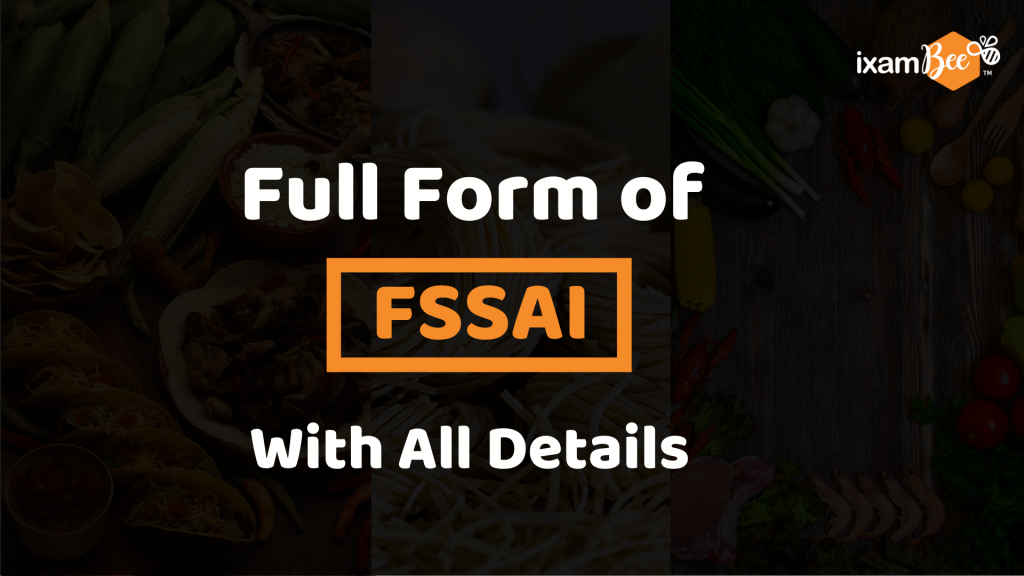What is FSSAI?
FSSAI stands for Food Safety and Standards Authority of India. It is an independent body established under the ‘Ministry of Health & Family Welfare’ (Government of India). It was established by former Union Health Minister Dr. Anbumani Ramadoss on 5th of September 2008 under the Food Safety and Standards Act, 2006, which is a law related to the safety and regulation of food products in India. The headquarters of FSSAI is located in ‘New Delhi’ and has 6 regional offices in India (Delhi, Guwahati, Mumbai, Kolkata, Cochin and Chennai), 14 referral laboratories, 72 State/UT laboratories throughout India and 112 laboratories, all notified by FSSAI. It is headed by a non-executive chairperson who is appointed by the Central Government and includes 22 members apart from the chairperson.
Functions & Responsibilities of FSSAI
As the full name suggests, FSSAI is an organization related to food safety and its business in India. Its main objective is to ensure that whatever food products are ready to hit the market, are duly checked if they are safe and fit to be promoted further. The main functions can be summarised as follows:
- Ensuring the quality checks and supervision of major food products is the main function of FSSAI, through which it also ‘promotes and ensures public health’.
- Formulating standards for food products.
- Maintaining the level of food quality.
- Issuing license to certain Food Business Operators, based on the type of business and its turnover.
- Setting certain rules and regulations.
- Inspecting the food items on the basis of a checklist of regulations.
- Promoting and assuring public health.
- Implementing ways or means in order to get rid of the harmful and hazardous elements in the food products and improve the quality.
- To inform the consumers of the product safety details through the packaging of the product.
FSSAI License
FSSAI is responsible for issuing the license to the business operators who are involved in various levels of the food business, like manufacturing, distribution, processing, and final sale of the food products. It is compulsory for all such food business operators (FBOs) to get FSSAI registration and license in order to continue with their business smoothly. For all the products that receive such registration/license, they get a 14-digit number printed on their respective food packages. FSSAI issues three types of license:
- Registration: For a business whose turnover is less than Rs 12 Lakh.
- State License: For a business whose turnover is between Rs 12 Lakh to Rs 20 Crore.
- Central License: For a business whose turnover is above Rs 20 Crore.
Apart from the main criteria of the type of business and the turnover, some other factors like the location and number of stores of the business are also taken into consideration while finalizing the type of license to be issued to a business operator.
All the business owners or operators who possess an FSSAI Registration or license are supposed to follow all the rules and regulations specified under the FSS Act 2006.
FSSAI Inspection and Approval
A Food Safety Officer inspects any food item and checks if any business operator complies to the specified norms and to which level. After the inspection, the Food Safety Officer marks it on 4 levels as follows:
- Compliance (C)
- Non-compliance (NC)
- Partial compliance (PC)
- Not Applicable / Not observed (NA)
If required, the Food Safety Inspector issues an improvement notice as per Sec 32 of the FSS Act 2006. If any business owner fails to observe and follow the improvement notice as required, the Inspector will give him one opportunity to ‘show cause’ and explain the reasons and if he/she fails to do so, the license may get canceled.
FSSAI: Non-Compliance Penalty
Depending on the level or type of non-compliance, the business owners are slapped with a fine of varied amounts as follows:
| S.No | Details / Type of Non-compliance | Fine |
| 1. | Food quality not in compliance with the act | 2 Lakh
Petty manufacturer – 25,000/- |
| 2. | Sub-standard food | 5 Lakh |
| 3. | Misbranded Food | 3 Lakh |
| 4. | Misleading advertisement or false description | 10 Lakh |
| 5. | Extraneous matter in food | 1 Lakh |
| 6. | Failure to comply with Food safety officer direction | 2 Lakh |
| 7. | Unhygienic processing or manufacture | 1 Lakh |
FSSAI Food Standards
The assurance of quality remains the primary task of the Food Safety and Standards Authority of India and thus it frames certain regulations in the same direction and formulates certain standards for the categories of foods. The FSSAI has established standards for the following food products:
- Dairy products and analogues
- Fats, oils and fat emulsions
- Fruits and vegetable products
- Cereal and cereal products
- Meat and meat products
- Fish and fish products
- Sweets & confectionery
- Sweetening agents including honey
- Salt, spices, condiments and related products
- Beverages, (other than dairy and fruits & vegetables based)
- Other food product and ingredients
- Proprietary food
- Irradiation of food
The standards set up for the food products are not fixed and are subject to change depending on the new discoveries or inventions in the food science, food preferences of the consumers and technologies brought into use.
Also Read:
& Many More..
Get Free Online Test Series, Daily GK Update, PIB Current Affairs, Banking Awareness as well as latest updates for Bank PO, Bank Clerk, SSC, RBI, NABARD and Other Government Jobs.
займ без процентов на картубыстрый займ на карту не выходя из домапогасить займ домашние деньги
